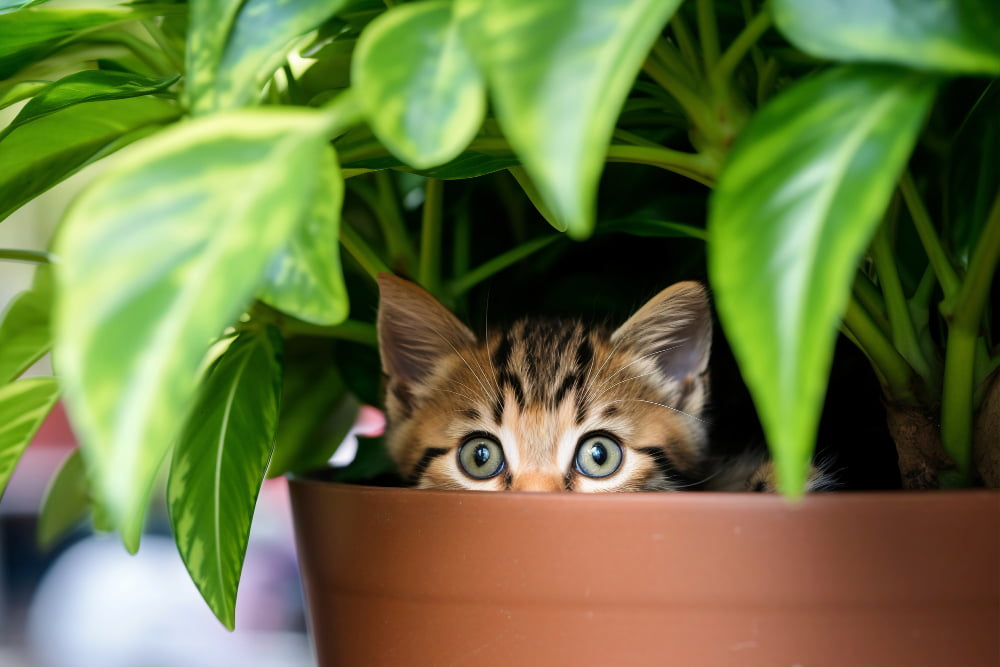Is Your ZZ Plant Toxic to Cats? Understanding the Dangers
Cats are curious creatures, often exploring their surroundings with playful abandon. While this curiosity is endearing, it can sometimes lead to unintended consequences, especially when it comes to plants within the home. One such plant that poses a threat to our feline friends is the ZZ plant.
What is the ZZ Plant?
The ZZ plant, scientifically known as Zamioculcas zamiifolia, is a popular indoor plant appreciated for its glossy green foliage and low maintenance requirements. Its resilience to neglect and ability to thrive in low light conditions make it a favorite among houseplant enthusiasts.
Overview of Cat Toxicity
Despite its aesthetic appeal and ease of care, the ZZ plant harbors a hidden danger for cats. This danger lies in the toxic components present within its leaves and stems, particularly calcium oxalate crystals.
ZZ Plant Toxic Components
Calcium Oxalate Crystals
These microscopic crystals are responsible for the ZZ plant’s toxicity to cats. When ingested, they can cause irritation and discomfort in the mouth, throat, and gastrointestinal tract of felines.
How They Affect Cats
Upon contact with the mucous membranes of a cat’s mouth, tongue, and throat, calcium oxalate crystals can trigger a range of adverse reactions.
Symptoms of Ingestion
Common symptoms of ZZ plant ingestion in cats include drooling, pawing at the mouth, difficulty swallowing, and vomiting. In severe cases, it can lead to swelling of the tongue and throat, posing a life-threatening risk.
Risks and Dangers
Potential Health Issues
The ingestion of ZZ plant leaves or stems can result in various health issues for cats, with the most concerning being kidney problems and gastrointestinal distress.
Kidney Problems
Ingestion of calcium oxalate crystals can potentially lead to kidney damage in cats, particularly if left untreated.
Gastrointestinal Distress
The abrasive nature of the crystals can cause irritation and inflammation in the digestive tract, resulting in symptoms such as diarrhea and abdominal pain.
Recognizing Toxicity
Signs of ZZ Plant Ingestion
It’s essential for cat owners to be vigilant for signs of ZZ plant ingestion to ensure prompt medical attention for their furry companions.
Vomiting and Nausea
One of the primary indicators of ZZ plant toxicity in cats is vomiting, often accompanied by signs of nausea such as lethargy and loss of appetite.
Oral Irritation
Cats may exhibit signs of oral irritation, including excessive drooling, pawing at the mouth, and reluctance to eat or drink.
Preventive Measures
Keeping ZZ Plants Out of Reach
To mitigate the risk of ZZ plant toxicity in cats, it’s crucial to take proactive measures to prevent access to the plant.
Safe Placement
Keep ZZ plants in areas that are inaccessible to cats, such as high shelves or hanging planters.
Alternatives for Cat Owners
Consider choosing cat-safe houseplants as alternatives to the ZZ plant to ensure the well-being of your furry companions.
Emergency Response
Steps to Take If Ingestion Occurs
In the event of ZZ plant ingestion, swift action is paramount to minimize harm to your cat.
Contacting a Veterinarian
Immediately contact your veterinarian or an emergency pet hotline for guidance on next steps.
Providing First Aid
While awaiting professional assistance, rinse your cat’s mouth with water to help remove any lingering plant residue and soothe irritation.
Conclusion
In conclusion, while the ZZ plant may enhance the aesthetic appeal of your home, its toxicity to cats warrants careful consideration for pet owners. By understanding the risks associated with ZZ plant ingestion and implementing preventive measures, you can create a safer environment for your feline companions.
FAQs
1. Are all parts of the ZZ plant toxic to cats? While the leaves and stems contain the highest concentration of calcium oxalate crystals, all parts of the ZZ plant, including the roots, can pose a risk to cats if ingested.
2. Can ZZ plant toxicity be fatal to cats? While rare, severe cases of ZZ plant toxicity can potentially be fatal to cats, especially if left untreated. Prompt veterinary care is crucial for a positive outcome.
3. How can I tell if my cat has ingested a ZZ plant? Common signs of ZZ plant ingestion in cats include vomiting, drooling, oral irritation, and gastrointestinal distress. If you suspect your cat has ingested a ZZ plant, seek veterinary attention immediately.
4. Are there any safe alternatives to the ZZ plant for cat owners? Yes, several houseplants are considered safe for cats, including spider plants, Boston ferns, and African violets. Research cat-friendly plants to find suitable alternatives for your home.
5. Can ZZ plant toxicity affect other pets besides cats? While cats are the most commonly affected by ZZ plant toxicity due to their curious nature, other pets such as dogs may also experience adverse reactions if they ingest the plant. It’s essential to keep all pets away from potentially toxic plants.






